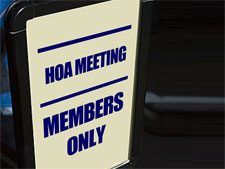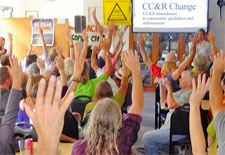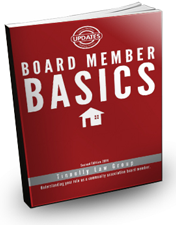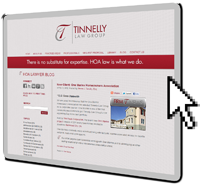|
|
|
|
|
Community Association Update / Issue # 21
Annual Legislative & Case Law Update (2014)
|
|
Legislative & Case Law Update (2014): Introduction
Happy New Year! Below you will find an overview of the 2013 legislation and case law impacting California community associations as we head into 2014. The material below is not meant to be an exhaustive list of all new legislation and case law; we have summarized what we believe is the most important to the majority of our community association clients and the industry professionals who service them. If you have any questions regarding the items below, please feel free to contact our offices anytime. | |

| Sincerely,
Steven J. Tinnelly, Esq.
|
|
The "New" Davis-Stirling Act
Overview of the notable changes to the Act effective January 1, 2014

Beginning January 1, 2014, the "new" Davis-Stirling Common Interest Development Act ("Act") takes effect. The Act relocates the prior Civil Code provisions governing HOAs to Division 4 of the Civil Code, and seeks to make the Act easier to interpret and apply by standardizing terminology and grouping provisions by subject matter.
While much of the language of the prior Civil Code provisions remains intact, there are some changes worth noting. Those changes involve the following Civil Code Sections:
Civ. Code §4045. Providing General Delivery or Notice.
Expands upon the ways in which "general notice" may be given to members
Civ. Code §4205. Hierarchy of Document Authority. (*New)
Sets forth a hierarchy of governing documents to be used when faced with conflicting provisions
Civ. Code §4235. Correction of Cross-Referencing in Documents. (*New)
Board may amend CC&Rs without membership approval to correct Code references
Civ. Code §4600. Grant of Exclusive Use.
Adds new exceptions to membership approval requirement for grants of exclusive use
Civ. Code §5125. Custody of Ballots.
Expands period when ballots must remain in custody of Inspector of Elections
Civ. Code §5200. Member Inspection Rights.
Adds governing documents to the list of HOA records that may be inspected by a member
Civ. Code §5260. Requests That Must be in Writing. (*New)
Establishes certain requests by members that must be made in writing
Civ. Code §5300. Annual Budget Report.
Consolidates various HOA financial disclosure requirements under this new term
Civ. Code §5310. Annual Policy Statement.
Consolidates and clarifies various requirements relating to HOA policy disclosures
Civ. Code §5350. Prohibited Actions by Directors & Committee Members.
Clarifies situations where a Director/committee member must abstain from voting on an action
Civ. Code §5850. Schedule of Monetary Penalties.
Fine schedule must now be included in Annual Policy Statement
Civ. Code §5855. Notice of Disciplinary Hearing.
Extends notice and hearing requirements to situations involving reimbursement assessments
For more information on these changes, click here to read our blog post entitled:
"Basics of AB 805: Overview of Changes in Davis-Stirling Act"
|
SB 752: Commercial & Industrial CID Act
Provides for the creation and regulation of Commercial and Industrial CIDs; Effective 01/14

Commercial and Industrial Common Interest Developments ("Commercial CIDs") in California have historically been governed by the same provisions that apply to planned residential developments and condominiums: the Davis-Stirling Common Interest Development Act ("Davis-Stirling"). However, some of those provisions have resulted in unnecessary burdens and requirements for Commercial CIDs that were really tailored to provide consumer protections for homeowners in residential settings (i.e., open meeting, election and disclosure requirements).
In light of this issue, on September 6, 2013, the California Legislature passed SB 752: the Commercial and Industrial Common Interest Development Act. SB 752 mirrors many of the provisions contained in Davis-Stirling, but omits some of the requirements that were geared toward residential homeowners...
Click here to continue reading our blog post entitled:
"SB: 752: Commercial & Industrial CID Act Signed into Law"
|
SB 822: HOA Managers Not "Contractors" or "Consultants"
Clarifies contractor licensing requirements under Ca. Business & Professions Code; Effective 01/14

SB 822, in part, clarifies recent amendments to the California Business and Professions ("B&P") Code relating to "contractors" whom are required to be licensed by the state. The clarifying language was introduced in the wake of the confusion and concern that had surfaced regarding whether HOA managers were required to hold a contractor's license in order to perform common tasks such as obtaining bids and overseeing the progress of ongoing construction work.
SB 822 adds the following provision to Section 7026.1(b) of the B&P Code:
"The term "contractor" or "consultant" does not include a common interest development manager, as defined in Section 11501, and a common interest development manager is not required to have a contractor's license when performing management services, as defined in subdivision (d) of Section 11500."
However, this does not mean that HOA managers should interpret this language as a "green light" to act as de facto construction managers...
Click here to continue reading our blog post entited:
"HOA Managers Not 'Contractors,' But Beware..."
|
Friars Village HOA v. Hansing (2013)
Court upholds use of HOA election rules for Director qualifications

HOAs have been traditionally required to formally amend their Bylaws in order to establish, clarify or expand qualifications for members seeking to serve on the HOA's Board of Directors. This generally requires the approval of the membership and a formal vote which, as many Boards and industry professionals understand, often acts as a significant hurdle to achieving the HOA's goals.
However, as a result of Friars Village Homeowners Association v. Hansing (2013) ("Friars Village"), it appears that a less onerous mechanism for enacting new director qualifications may now be available. Friars Village dealt with a lawsuit brought by a HOA member challenging the validity of an HOA election rule that prevented any member from seeking a position on the Board if that member was related by blood or marriage to any current Board member or other candidate for the Board. The Court ultimately ruled for the HOA, finding that the election rule was both reasonable and rationally related to the proper conduct and business affairs of the HOA. This decision may establish a basis for adopting director qualifications through the implementation of reasonable election rules rather than through formal amendments to the Bylaws.
For more information on Friars Village, click here to read our blog post entitled:
"Court Upholds Use of HOA Election Rules for Director Qualifications"
|
SB Liberty, LLC v. Isla Verde Association, Inc. (2013)
Addressing who is entitled to attend HOA Board meetings on an Owner's behalf

One issue that surfaces from time to time deals with the extent to which a HOA is required to allow a member to attend a Board meeting with her attorney, or to allow a member's attorney or agent to attend the Board meeting on the member's behalf. This issue may be complicated further if the owner of a property (the "member" under the HOA's governing documents) is an entity (i.e., a business organization or a family trust).
The recent case of SB Liberty, LLC v. Isla Verde Association (2013) ("SB Liberty") will help resolve this issue and will provide valuable guidance for HOAs moving forward. Using a combined analysis of pertinent Civil Code provisiosn and the definition of "member" set forth in the HOA's governing documents, the Court in SB Liberty held that the right to attend and participate in Board meetings doe not extend to attorneys, designated representatives, or any other party other than the "owner" of the property. The Court went on to clarify who may attend Board meetings where an entity, such as an LLC, is the "owner" of a property within a HOA.
For more information on SB Liberty, click here to read our blog post entitled:
"Who is Entitled to Attend Board Meetings on an Owner's Behalf?"
|
Wittenberg v. Beachwalk Homeowners Association (2013)
Equal access to HOA media outlets during election campaigns

HOA Boards are always looking for ways in which they can educate the members on the Board's position and the reasons why the Board believes that the membership should vote a particular way in an upcoming election. HOA Boards may therefore seek to utilize media outlets such as the HOA's website and newsletters, as well as posting notices in HOA common areas, in an effort to garnish member support for the Board's position. However, when such "advocacy" efforts are made as part of an election campaign, the Civil Code requires the HOA to provide equal access to its media outlets and common areas to all members who may be advocating opposing points of view.
This was the issue in the case of Wittenberg v. Beachwalk Homeowners Association (2013) ("Wittenberg"), where the Court held that a HOA's election results could be invalidated based upon the fact that the HOA Board had failed its duty to provide homeowners with the type of equal access contemplated by the Civil Code. Wittenberg involved issues concerning the Board's use of the HOA website and newsletter for "advocacy" purposes, as well as the HOA's refusal allow a homeowner to utilize common areas, free of charge, for holding a membership rally relating to the upcoming election.
For more information on Wittenberg, click here to read our blog post entitled:
"Equal Access to HOA Media Outlets During Election Campaigns"
|
Diamond v. Casa Del Valle HOA (2013)
Strict compliance with HOA collection procedures and requirements

Because the assessment collection methods sanctioned under a HOA's governing documents and California law can result in the foreclosure of a delinquent homeowner's property, it is paramount that HOAs strictly comply with the statutory procedures and requirements applicable to assessment collection (i.e., transmittal of notices, dispute resolution procedures, votes to initiate foreclosure, etc.).
The case of Diamond v. Casa Del Valle Homeowners Association (2013) ("Diamond") illustrates how failing to comply with those procedures and requirements can result not only in the invalidation of a HOA's assessment lien, but also an award of attorney's fees and costs to the delinquent homeowner. The issues in Diamond involved errors with the notice of assessment lien, the notice of the right to request ADR, the Board vote to foreclose on the lien, and the notice of the Board's decision to foreclose.
For more information on Diamond, click here to read our blog post entitled:
"HOA Collection Procedures: Strict Compliance Required"
|
Multani v. Witkin & Neal (2013)
Homeowner redemption rights after HOA nonjudicial foreclosure

The Diamond case (above), underscores the necessity for a HOA to strictly comply with the statutory procedures and requirements pertaining to assessment collection. The case of Multani v. Witkin & Neal (2013) ("Multani") similarly involved allegations of procedural defects by a HOA's collection agent. However, the Court's ruling in Multani is significant in that it addresses the statutory, ninety (90) day "right of redemption" afforded to a homeowner that may have lost ownership of his unit through nonjudicial foreclosure of a delinquent assessment lien.
The "right of redemption" allows for the delinquent (foreclosed) homeowner to "redeem" (to reinstate his ownership of) the unit within ninety (90) days following the nonjudicial foreclosure sale by paying the "redemption price" in accordance with Ca. Code of Civ. Proc. Sec. 729.060. One significant issue in Multani was the HOA's failure to demonstrate that it had provided the foreclosed homeowner with requisite notice of his redemption rights once the nonjudicial foreclosure sale had completed.
For more information on Multani, click here to read our blog post entitled:
"Redemption Rights after HOA Nonjudicial Foreclosure"
|
San Miguel Community Association v. State Farm General Ins. Co. (2013)
No duty of HOA insurance carrier to defend non-monetary claims brought against HOA

The holding in San Miguel Community Association v. State Farm General Ins. Co. (2013) ("San Miguel") illustrates the importance of understanding the scope and limitations of the coverages afforded to a HOA under its insurance policies. In San Miguel, two homeowners sought to force the HOA to take action to curb ongoing parking violations within the community. After the HOA refused to take action, the homeowners demanded the HOA's participation in mediation, thereby prompting the HOA to tender the matter to its insurance carrier, State Farm. In responding to the HOA, State Farm noted that the claims brought by the homeowners did not seek the recovery of monetary damages, and were therefore insufficient to trigger State Farm's obligation to defend the HOA or to reimburse the HOA for its defense costs.
After mediation failed and the homeowners filed a lawsuit against the HOA, the HOA renewed its attempt to tender the dispute to State Farm. However, State Farm once again denied defense coverage on the basis that the suit did not involve a claim for monetary damages, and therefore failed to "seek damages that would be covered under the policy" purchased by the HOA. The HOA then brought suit against State Farm, arguing unsuccessfully that State Farm's defense obligations were triggered by the fact that the homeowner's claims implied that monetary damages would be sought. The court ultimately ruled in favor of State Farm, holding that, pursuant to the terms of the HOA's insurance policy, State Farm was under no obligation to provide defense coverage until the claim for damages was formally brought by the homeowners.
For more information on San Miguel, click here to read our blog post entitled:
"No Duty of HOA Insurance Carrier to Defend Non-Monetary Claims"
|
Grossman v. Park Fort Washington Association (2012)
Recovering pre-litigation attorneys' fees in HOA disputes

Attorneys' fees incurred by a HOA in participating in Alternative Dispute Resolution ("ADR") with a homeowner have been traditionally viewed as fees which can not be recovered from the homeowner if the HOA prevails. This is because ADR has not been formally classified as an "action" to enforce the governing documents within the meaning of Civil Code Sec. 5975.
However, as a result of the ruling in Grossman v. Park Fort Washington Association (2012) ("Grossman"), a HOA may now recover its pre-litigation attorneys' fees (i.e., attorney's fees spent in ADR) if the dispute escalates to a lawsuit in which the HOA prevails.
For more information on Grossman, click here to read our blog post entitled:
"Recovering Pre-Litigation Attorneys' Fees in HOA Disputes"
|
|

We are pleased to share that 2013 was another year of growth and expansion for Tinnelly Law Group. In addition to the approximately 30 new clients that we began working with, we launched our assessment collection affiliate, Alterra Assessment Recovery. Many of our clients have already benefited from Alterra's comprehensive service offering and efficient approach to assessment collection. We look forward to continuing to resolve their delinquencies and to protecting the financial health of their associations.
We would like to thank our clients and industry partners for their continued support as we head into a very busy 2014!
TLG Updates Board Member Basics
A Guidebook Written for Association Board Members
Second Edition 2014

We understand that the numerous legal duties and obligations of board members can be intimidating, especially for new board members. Board Member Basics was created to help provide board members with a basic understanding of the important role they play, as well as the various legal obligations they must fulfill in managing their association's affairs.
Inside, we've included pertinent Code sections and case law excerpts, along with real world, practical guidance for board members of all types of associations. This second edition of Board Member Basics includes updates to the Davis-Stirling Act effective January 1, 2014, as well as 2013 case law.
To learn more about Board Member Basics, or to request an updated copy,
click here to view our Web site's new "Publications" page.
|
|
Be sure to check out the TLG Blog!
 Our blog is updated weekly with mini articles on an array of HOA legal topics and new case law. We encourage Boards and Managers to send us questions online for our attorneys to answer on our blog. Our blog is updated weekly with mini articles on an array of HOA legal topics and new case law. We encourage Boards and Managers to send us questions online for our attorneys to answer on our blog.
To get updated when we publish a new post, be sure to like us on facebook!

|
|
|
|
|
|
Community Association Update - Issue #21
Annual Legislative & Case Law Update (2014)
NOTICE: The information contained in the Community Association Update is for educational and informational purposes only and does not constitute legal advice, nor is it meant to create an attorney-client relationship.
|
 Corporate Headquarters: Corporate Headquarters:
30 Enterprise - Suite 320
Aliso Viejo, CA 92656
P: 949.588.0866
F: 949.588.5993
contact@tinnellylaw.com
| |
Orange County | Los Angeles | San Diego | Riverside County | San Francisco Bay Area
|
|
|